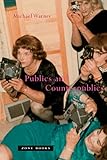Andrew Keen turned up at Google today to plug his book The Cult of the Amateur: How today's Internet is killing our culture. I was too late to get a copy of the book, so reviewing that will have to wait until Amazon delivers me one later this week. Instead, I listened closely and read some of his soi-disant polemics on his blog.
Like Nick Carr, and before him Andrew Orlowski and John Dvorak, Keen is a professional troll. He has realised that combining overblown rhetorical attacks on the internet with a smattering of erudite sounding quotation gets him both newspaper commissions and a lot of links from bloggers, and he is making the most of it. Listening to his arguments, I had the feeling that he was clutching at so many straws so he had enough to build his straw man.
Among the things he said were that he's nostalgic for big media, that the web is not a viable economy for artists, and we need middlemen. Talent is scarce - the value is finding talent. Web 2.0 flattened media lends itself to corruption - media without official gatekeepers is untrustworthy. Youtube is becoming one long commercial break, where the 'best content is sponsored', that most of his evidence is anecdotal, people aren't as smart or as media literate as we'd like them to be and that online anonymity is corrupting (yet he plays along with the wholly fictitious Strumpette).
Andrew Keen's real sleight of hand is that he evokes the best of newspapers and contrasts that with the mass of the web. He says that most musicians won't make money from the web, ignoring that hardly any make money from the label system he defends. Like Carr, his worldview is wholly coloured by survivorship bias.
Now, I recognise a lot of this - being an Englishman in America makes it very tempting to play the Cultural Erudition card - having recently watched the excellent The History Boys, he reminded me of Irwin, the master keen to use gobbets of quotations to support an arbitrarily contrarian premise. This kind of Oxbridge cleverness for its own sake is part of the Guardian/BBC Platonist culture that sees its role to lead the uneducated masses to better themselves, while sneering at their plebian interests. Keen continually calls Google "Orwellian", while ignoring the emotional core of 1984, which is the tension between Winston's day job at the (BBC-derived) Ministry of Information, controlling the party line, and his private diary, written "to the future or to the past, to a time when thought is free, when men are different for one another and do not live alone". Michael Warner's essay "Styles of Intellectual Publics" expresses this yearning well, and Keen's denial of it to those outside the clerisy of the professional media is a betrayal of the enlightenment principles he professes.
So what did I like? I liked that he said the web was a mirror of ourselves, but I see him as a Caliban cursing his reflection, as I said five years ago:
The web we see is a reflection of ourselves individually as well as collectively.
With 2 billion pages and counting, we can never see it all, and when we venture outside the well trodden paths of the personal web we know, we are more likely to make mistakes in our maps, and come back with 'here be dragons' written across entire continents and tales of men with no heads.
I think this effect, rather than malice or wilful misrepresentation is what is behind such things as journalists' clueless articles on weblogs or congressman fulminating against the net consisting mostly of porn and piracy.
I also liked his call for media literacy, though his assumption that internet users are children who don't have it was more de haut en bas posturing. Douglas Adams put paid to this back in 1999:
Of course you can’t ‘trust’ what people tell you on the web anymore than you can ‘trust’ what people tell you on megaphones, postcards or in restaurants. Working out the social politics of who you can trust and why is, quite literally, what a very large part of our brain has evolved to do. For some batty reason we turn off this natural scepticism when we see things in any medium which require a lot of work or resources to work in, or in which we can’t easily answer back – like newspapers, television or granite. Hence ‘carved in stone.’ What should concern us is not that we can’t take what we read on the internet on trust – of course you can’t, it’s just people talking – but that we ever got into the dangerous habit of believing what we read in the newspapers or saw on the TV – a mistake that no one who has met an actual journalist would ever make. One of the most important things you learn from the internet is that there is no ‘them’ out there. It’s just an awful lot of ‘us’.
Update: Larry Lessig points out many of the inaccuracies of the book:
And then it hit me: Keen is our generation’s greatest self-parodist. His book is not a criticism of the Internet. Like the article in Nature comparing Wikipedia and Britannica, the real argument of Keen’s book is that traditional media and publishing is just as bad as the worst of the Internet. Here’s a book — Keen’s — that has passed through all the rigor of modern American publishing, yet which is perhaps as reliable as your average blog post: No doubt interesting, sometimes well written, lots of times ridiculously over the top — but also riddled with errors. Keen’s obvious point is to show those with a blind faith in the traditional system that it can be just as bad as the worst of the Internet. Indeed, one might say even worse, since the Internet doesn’t primp itself with the pretense that its words are promised to be true.
Larry has a wiki page for further corrections




